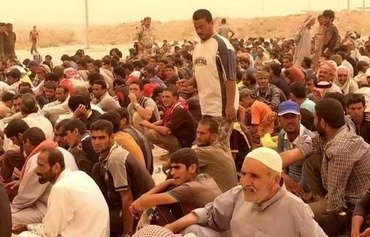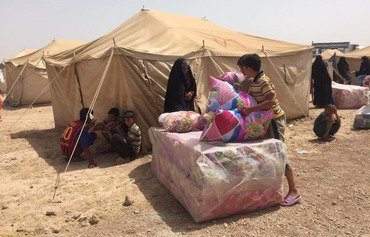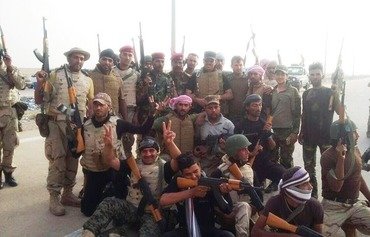Ismail Hameed Hassan is one of the thousands of Fallujah residents who have managed to escape the grip of the "Islamic State of Iraq and the Levant" (ISIL).
Speaking with Mawtani from al-Karma Island displacement camp to the north of Fallujah, where he and his family found refuge after fleeing their city, he described conditions inside Fallujah, which has been under ISIL control since January 2014.
"We have been suffering from hunger over the past few months, and ISIL was preventing food and medicine from getting to us," he said.
Inside the city, the group also used food as a bargaining chip, he added, withholding it until families agreed to send their sons to fight in its ranks.
"We have been in a big prison, and everyone trying to escape was destined to be killed," Hassan said, his face pale and his clothing in tatters.
In an attempt to prevent residents from fleeing, ISIL fighters had been deployed to the contact lines with the Iraqi army, he said, "and they did not hesitate to kill any civilians trying to escape from Fallujah".
"We were surprised at the poor physical and mental health of the displaced people arriving from Fallujah," said Sheikh Sabah Abdul Hamid, an officer of the popular mobilisation committee that is overseeing the camp.
Many of them, including children, were suffering from dehydration, he told Mawtani, and they were clearly traumatised by what they had endured.
"They fled the city on their own, leaving their homes and their cars," he said.
"Some of them even arrived barefoot with threadbare clothes," he added. "Some came without even one dinar in their pockets, and seemed willing to sacrifice anything to escape the control of the terrorist organisation."
Fallujah residents under pressure
Fallujah residents who did not agree to fight alongside ISIL were subjected to constant harassment from the group, Abdul Hamid said.
They were deprived of their most basic rights, including the right to food and medicine, he said.
Some families were forced to subsist on animal feed, while others found it difficult to obtain any food at all, he added, while the families of ISIL fighters enjoyed a relatively luxurious situation.
The group's treatment of civilians is based on their level of loyalty, he said.
When the battle to liberate Fallujah began, ISIL only allowed its fighters' families to cross the river by boat towards Ameriyat al-Fallujah, then immediately closed the route and started killing anyone trying to flee, he said.
On June 10th, ISIL fighters opened fire on a group of civilians trying to escape from the city, killing seven and wounding 16, Fallujah mayor Issa al-Issawi told Mawtani.
The bodies of the victims, slain at al-Salam Intersection area, remained in no man's land, he said, while a number of the injured were able to reach the Iraqi forces, who took them to a field hospital for treatment.
Civilians used as human shields
In a May 27th statement, UN High Commissioner for Refugees spokeswoman Melissa Fleming said there had been "dramatic reports of the increase of the number of executions of men and older boys refusing to fight on behalf of ISIL".
"Other reports say a number of people attempting to depart [Fallujah] have been executed or whipped," she said.
Civilians attempting to escape the city have said they had to travel on foot for hours at night, moving through farms and hiding in abandoned irrigation pipes.
An estimated 15,000 civilians have managed to flee Fallujah, said Fadel al-Gharawi, who serves on Iraq's Independent High Commission for Human Rights.
Most of them are from al-Sajr and al-Karma areas, while up to 50,000 residents remain trapped inside the city, he told Mawtani.
"Most of those displaced from the city are in poor mental and physical health as a result of ISIL's brutal actions against them before they fled the city," he said.
ISIL used civilians as human shields, he said, particularly in the al-Golan and al-Muallimeen neighbourhoods.
The Iraqi army tried to avoid clashing with ISIL fighters in these areas out of concern for the civilian population, he said, and was forced to break into the city through al-Shohada neighbourhood in spite of the difficulties in that corridor.
Meanwhile, he noted, life has been completely suspended inside Fallujah.
There are no electricity services, there is no water to drink and ISIL has been blocking Internet services and banning the use of smart phones, he said.
Additionally, he said, ISIL has recently recruited children in the city and sent them into battle on its behalf.

![Iraqi forces help residents of Fallujah who fled to save their lives. [Photo courtesy of the Joint Operations Command]](/cnmi_di/images/2016/06/16/5614-Iraq-fallujah-escapees-600_384.jpg)







Victory for Iraqi Army and peace and calm for the people of Iraq, God willing,
Reply1 Comment(s)